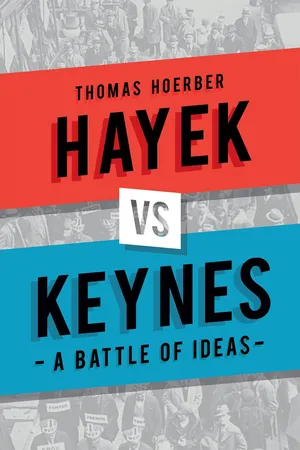
- English
- ePUB (mobile friendly)
- Available on iOS & Android
eBook - ePub
About this book
Hayek vs Keynes: A Battle of Ideas offers a clear historical account of the works of the two great totems of modern economic thought: Friedrich Hayek and John Maynard Keynes. Hayek’s The Road to Serfdom and Keynes’s The General Theory of Employment, Interest and Money were written against a background of devastation following the First World War. Thomas Hoerber explains the historical context in which the books were written and shows how lessons can be drawn for current economic and political phenomena, such as the recent financial crisis, globalization and European integration. He illustrates how classical economic theory as well as a qualitative method in economics can enlighten our understanding of the present economic environment. With a broad European perspective, this book places the two great economic thinkers of the twentieth century in their historical context, and asks what we can learn from their work today.
Tools to learn more effectively

Saving Books

Keyword Search

Annotating Text

Listen to it instead
Information
Table of contents
- Front Cover
- Half Title
- Title Page
- Copyright
- Contents
- Introduction
- 1 From the Eighteenth to the Twentieth Century: Momentous Change and Stable Elements
- 2 Hayek’s Road to Liberty
- 3 Information and Planning
- 4 Keynes’s General Theory
- 5 Man is Not the Master of His Own Fate: Misguided Socialist Idealism
- 6 Liberal Polemic, or, the Threat of National Socialism
- 7 The Necessity of Planning
- 8 Liberty and Totalitarianism
- 9 International Organizations and European Integration
- Conclusion
- Abbreviations
- References
- Bibliography
- Acknowledgements
- Index
Frequently asked questions
Yes, you can cancel anytime from the Subscription tab in your account settings on the Perlego website. Your subscription will stay active until the end of your current billing period. Learn how to cancel your subscription
No, books cannot be downloaded as external files, such as PDFs, for use outside of Perlego. However, you can download books within the Perlego app for offline reading on mobile or tablet. Learn how to download books offline
Perlego offers two plans: Essential and Complete
- Essential is ideal for learners and professionals who enjoy exploring a wide range of subjects. Access the Essential Library with 800,000+ trusted titles and best-sellers across business, personal growth, and the humanities. Includes unlimited reading time and Standard Read Aloud voice.
- Complete: Perfect for advanced learners and researchers needing full, unrestricted access. Unlock 1.4M+ books across hundreds of subjects, including academic and specialized titles. The Complete Plan also includes advanced features like Premium Read Aloud and Research Assistant.
We are an online textbook subscription service, where you can get access to an entire online library for less than the price of a single book per month. With over 1 million books across 990+ topics, we’ve got you covered! Learn about our mission
Look out for the read-aloud symbol on your next book to see if you can listen to it. The read-aloud tool reads text aloud for you, highlighting the text as it is being read. You can pause it, speed it up and slow it down. Learn more about Read Aloud
Yes! You can use the Perlego app on both iOS and Android devices to read anytime, anywhere — even offline. Perfect for commutes or when you’re on the go.
Please note we cannot support devices running on iOS 13 and Android 7 or earlier. Learn more about using the app
Please note we cannot support devices running on iOS 13 and Android 7 or earlier. Learn more about using the app
Yes, you can access Hayek vs Keynes by Thomas Hoerber in PDF and/or ePUB format, as well as other popular books in Economía & Negocios en general. We have over one million books available in our catalogue for you to explore.